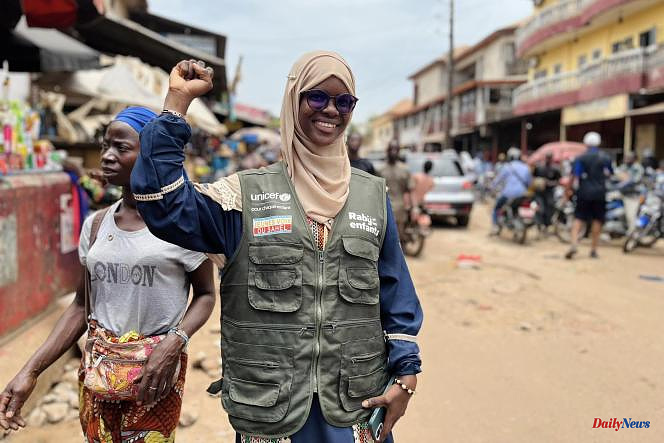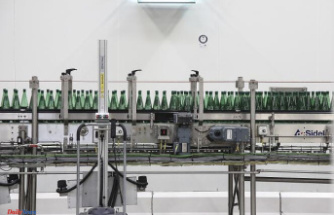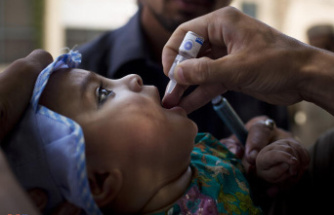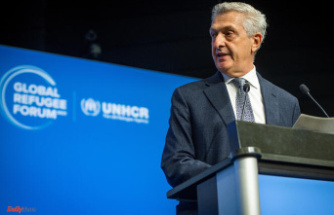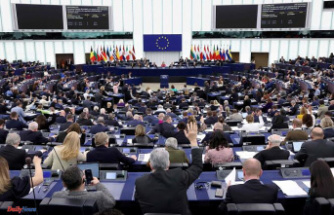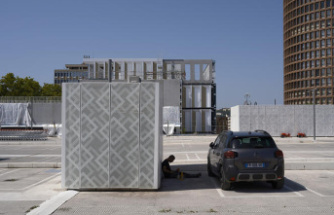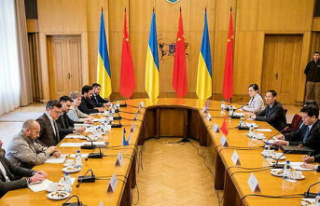The Kakimbo forest is suffocating. The former green lung of Conakry is necrotic by the wild and massive urbanization of the Guinean capital. Consumed by pollution, it now occupies only ten hectares, or 10% of what it was fifty years ago. A large sick body that Oumou Hawa Diallo, 24, wants to revive.
The environmental activist takes us to the foot of a retaining wall overlooking the almost dry bed of a stream. "Before, the elders came to bathe there," contemplates the young woman. The roots of the trees are intertwined with plastic bags carried, on days of heavy rain, by water pipes that overflow from the neighborhoods located above the forest. "It's an ongoing struggle trying to save what's left of this space," she said.
The surroundings of the place give an immediate idea of the dangers that threaten it. The Koloma district is a vast construction site. The Transversale number 2 cuts the peninsula in its width, from Sékou-Touré international airport, in the south, to the northern corniche along the Atlantic Ocean. Along the forest, the diggers dig the foundations of the future National Assembly and some ministries.
A few years ago, a gigantic United States embassy was erected in this neighborhood, encroaching on the forest. Then the Chinese erected the Weily Kakimbo hotel residence, two twin towers with 27 floors and 220 "high standing" apartments, boasts the website. A complex which, through an open pipe in a retaining wall, discharges some of its waste water and sand by the kilograms into the dry bed of this river which once generously irrigated the now moribund Kakimbo forest.
Land speculation
“The president of the transition [Colonel Mamadi Doumbouya, leader of the junta that took power by force in September 2021] promised in his speeches to protect the environment. It's encouraging, but let's stay vigilant," warns Oumou Hawa Diallo. It is not easy to curb land speculation in this city placed under intense demographic pressure.
This fight for the resurrection of the forest, the young woman, in charge of the digital development of a company present in particular in ecotourism after a computer science diploma, has been leading it since 2018 within the association Act against global warming ( Acorec), which she co-founded. When asked what made her decide to take up arms, Oumou Hawa Diallo delves into her childhood memories: "I grew up in a house full of plants and flowers that were treated like babies, like family members. And then in the village, we started to see the effects of global warming, the backwaters drying up, the rivers drying up. It germinated like that in my head. »
The reforestation of the Kakimbo forest, theoretically protected by its national heritage status, has thus become an objective. She and her friends from Acorec are carrying it out in collaboration with around thirty nurserymen grouped together in a cooperative and working on the site. They germinate the seedlings and take care of the replanted trees, particularly as part of an awareness-raising operation entitled "A birthday, a tree", imagined by the association and intended to encourage Guineans to plant a tree every day. festive. "From here, the operation has spread to other countries and 5,000 trees have been planted," says the young woman proudly.
This is a drop in the bucket considering the extent of deforestation, but the activist sees this result as a source of hope. "Guineans' awareness of their responsibility for pollution is advancing," she says. We must stop veiling our faces, saying that deforestation, soil erosion, flooding, all that is white stuff, or that it was God who wanted it, but that it is not ain't us…”
To convince, Oumou Hawa Diallo will preach the good word in schools, colleges and high schools. “You have to make every child a climate ambassador in their own family,” she explains. One of Acorec's projects for 2023 is to create a "climate club" bringing together academics responsible for raising awareness and training students on the urgency of reducing charcoal consumption in homes, one of the main sources deforestation (the government has promised to subsidize butane gas to allow it to be used by as many people as possible), and the need to recycle household waste...
"Plastic kills"
"We have to do something, Conakry is suffocating," she says. Doubt it? Follow me ! You don't need to stray far from Kakimbo Forest. Five minutes by motorcycle taxi from the former green lung rises an artificial and surreptitiously lethal hill, made up of waste stratified over the years. This is the landfill of Dar-es-Salam, one of the districts of Ratoma, a commune of Conakry.
Day and night, garbage trucks jostle on unsanitary paths to deposit there, over several hectares, the rubbish of the some 2 million inhabitants of the capital. Creatures that seem to come from the bowels of the earth burn tires all day long to recover the metal reinforcements and then melt them. Further on, children are sorting plastic bottles.
"Sometimes at night, when the landfill is burning, it looks like a volcano," says Oumou Hawa Diallo, holding her nose. A fetid volcano whose vapors, depending on the prevailing winds carried by the ocean that borders the peninsula of Conakry, poison well beyond the neighborhoods adjoining the landfill. Its move and the construction of a new modern landfill, partly financed by the French Development Agency (AFD), are planned. "But not for five years," says one expert. The toxic juices from heavy metal and bacteria-laden waste will continue to trickle down into groundwater and into the ocean.
“Sometimes parts of the hill collapse under the violence of tropical rains, reports Oumou Hawa Diallo. There are landslides, people buried in garbage. "Plastic doesn't die, it kills," she says thoughtfully from the top of this mountain of rubbish.
At the beginning of May, the young woman went to Dakar. A member of UNICEF's "Young Voices of the Sahel on Climate Change" initiative, she participated in the sixth edition of the World Forum of the Social and Solidarity Economy. "She works to earn a living, she is an activist, she is multiplying, she is everywhere," says, admiringly, one of her acquaintances at the UN agency. Oumou Hawa Diallo has fun. No time to rest. “In Dakar, we will share our experiences, our knowledge. This is the opportunity to network, to create common projects to save the planet. You have to go,” she explained before she left. Go there to continue his fight, relentlessly.

